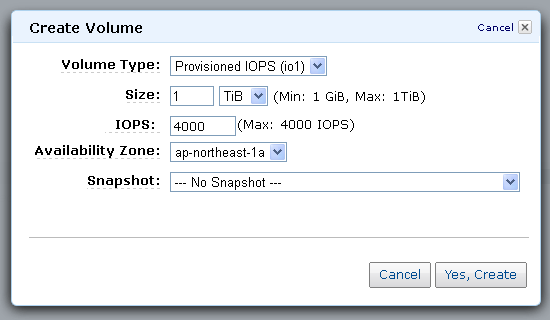AWS News Blog
Provision Up to 4,000 IOPS per EBS Volume, New Marketplace Support
|
|
I am happy to announce that EBS Provisioned IOPS volumes now support up to 4,000 IOPS. This represents a fourfold increase from the original Provisioned IOPS volume performance since last year’s launch. You can now dial it up to 4,000 IOPS and up to 1 TB of storage per Provisioned IOPS volume. You no longer need to stripe (aka RAID 0) multiple volumes to reach the 4,000 IOPS performance level. However, if you do need even more performance, you can create multiple EBS volumes, each with Provisioned IOPS, and then stripe across them.
We are also introducing support for Provisioned IOPS in the AWS Marketplace with new products from 10Gen, NuoDB, and Omnibond. With this new support, you can now find, compare, and start the software that you need with 1-click, while specifying the desired level of performance. For more information, visit the new AWS Marketplace Provisioned IOPS page. Here are some initial reactions to this new feature:
- On the MongoDB blog, Jared Rosoff talks about the effect of storage configuration on MongoDB performance. He notes that many issues that they encounter in the field turn out to be related to misconfigured or under-provisioned storage, and then goes on to introduce the new MongoDB AMIs. Jared says that the new AMIs remove the need for guess work and help to ensure a great out-of-the-box experience with MongoDB on EC2. The new AMIs are available in 1,000, 2,000, and 4,000 IOPS configurations and are based on the Amazon Linux AMI. They include a pre-tuned filesystem and OS configuration, and separate volumes for data, journal, and log storage.
- On the PalominoDB blog, Jay Edwards and Emanuel Calvo of PalominDB benchmarked PostgreSQL 9.2 using pgbench using EBS volumes provisioned for 4,000 IOPS. The post provides a lot of information about their system configuration, benchmarking tools, methodology. Just to make things interesting, the database servers were run on EC2 spot instances. Jay and Emanuel tested an instance that was equipped with a single EBS volume and another that was equipped with a four volume RAID 0 array. They used pgbench as the test driver, with a simulated load that ranged from 16 to 96 clients, and 100 to 1000 transactions per client. They measured 600-700 transactions/second on the first instance and up to 2200 transactions/second on the second one.
To recap, last year we introduced the Provisioned IOPS feature to give you the power to dial in the amount of performance (measured in I/O Operations Per Second or IOPS), with an initial maximum of 1,000 IOPS per volume. We raised the performance to 2,000 IOPS later in the year to give you more power and more flexibility. With 4,000 IOPS per volume, we have taken this to the next performance level.
Provisioned IOPS volumes are designed to deliver predictable, high performance for I/O intensive workloads such as databases, business applications and enterprise applications. You can set the level of performance you need and EBS will consistently deliver it over the lifetime of the volume.

To take full advantage of high performance Provisioned IOPS volumes, we recommend the use of EBS-Optimized EC2 instances. Available for our m1.large, m1.xlarge, m2.2xlarge, m2.4xlarge, m3.xlarge, m3.2xlarge, c1.xlarge and instance types, these instances feature dedicated throughput between EC2 and EBS.
Amazon EBS Provisioned IOPS volumes, EBS-optimized instances and AWS Marketplace products are now supported in all AWS regions except GovCloud.
— Jeff;
